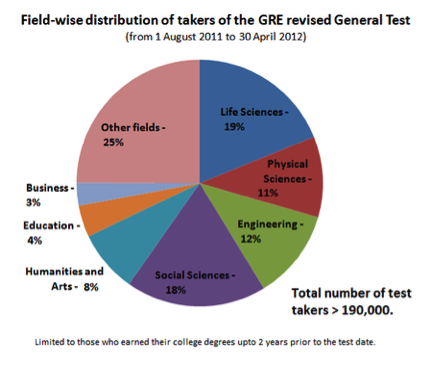Applicants to graduate schools of management now have the option to submit GRE scores in addition to, or instead of, GMAT scores. More than 800 MBA programs worldwide now accept the revised GRE as an alternative to the GMAT, including top schools like Columbia, Cornell, Harvard, Penn and Yale.
Traditionally, the required standardized admissions test for graduate business schools was the GMAT (Graduate Management Admissions Test), now accepted at over 1600 universities and programs worldwide. The GMAT contains four sections: Analytical Writing, Integrated Reasoning, Quantitative and Verbal.
Alternatively, the GRE (Graduate Record Examination) has served as the required standardized admissions test for applicants to Masters and Doctoral graduate programs (MA/MS/PhD degrees).
All that, however, has changed for B-School applicants!
In 2011, ETS significantly revamped the GRE to add a third section, Analytical writing, to the existing Quantitative and Verbal sections. Analytical writing includes two types of essays: the “Issue task,” an essay about a selected issue, and the “Argument task,” a critique of an argument’s logic. The pool from which the Analytical essays are chosen is available online, so students can prepare in advance.
Then in 2012, the GMAT underwent a significant update, when it introduced an all-new “Integrated Reasoning” section, a group of 12 questions that require test-takers to navigate complex charts and analyze data from multiple sources. The new section is designed to gauge how well applicants might fare in the more data-driven courses in business schools, themselves designed as preparation for an increasingly quantitative job landscape. There was some trepidation about the increased difficulty of this new section, with some going so far as to call the test “downright terrifying.” Other test-takers cited pacing as one the new test’s greatest challenges.
During the two years since the launch of the Revised GRE, students interested in the field of business constituted 3% of the total 440,000 test-takers (ets.org). As shown in the chart below, the largest fields represented were Life Sciences (23%), Social Sciences (17%) and Engineering (13%).
How can you decide which test is best for you?
- Students with greater strengths in quantitative data-analysis may prefer the GMAT, while more verbally inclined students may prefer the GRE.
- Your intended career field may have an influence. For example, Julie Barefoot, associate dean of MBA admissions at Emory’s Goizueta School, advises students interested in management strategy consulting to take the GMAT. Top firms in that field, such as McKinsey & Co. or Bain & Co., look at a candidate’s GMAT to assess business-related quantitative abilities.
- Since the new GMAT is faster-paced, students who require more time may prefer the GRE.
For more information, or further guidance on applying to business school, contact Collegiate Gateway at www.collegiategateway.com.

